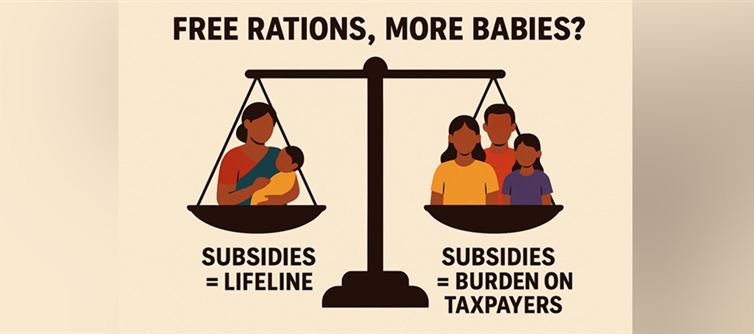
Go to any indian village and you’ll see the harsh truth: many families survive almost entirely on government subsidies—from free rations to cash schemes. While meant as safety nets, these schemes have created a culture of dependence. Worse, they sometimes disincentivize work and encourage larger families. Should india put strict limits—like restricting subsidies to families with only 1–2 children? Here’s the breakdown:
✅ Pros of Linking Subsidies to a Two-Child Norm
Encourages population Control
Families may think twice before having more kids if freebies and subsidies are capped. This can ease pressure on India’s already stretched resources.Promotes Self-Reliance
Ending the culture of free dependence forces able-bodied people to work and contribute rather than survive solely on government aid.Lowers Burden on Taxpayers
The middle class, which pays the bulk of taxes, won’t be forced to endlessly bankroll “freebies” for people who refuse to work.Better Targeting of Welfare
With fewer beneficiaries per family, subsidies could reach those who truly need them—rather than being spread thin across freeloaders.
❌ Cons of a Strict Two-Child Policy for Subsidies
Seen as Coercive
Forcing families to choose between children and benefits could spark backlash, especially among rural and marginalized communities.Hurts the Poor Most
Many poor families rely on free rations for survival. Cutting it off for larger families risks hunger and malnutrition, punishing children for parents’ choices.Fertility Rates Already Falling
India’s fertility rate has already declined to near replacement levels (~2.0). Experts warn a forced two-child policy could backfire like in China, creating aging population problems.Implementation Chaos
Corruption, fake ration cards, and poor data could make enforcement unfair—hurting honest families while corrupt middlemen find loopholes.
India’s welfare state is at a crossroads. Do freebies fuel population growth and laziness—or are they a lifeline for the poor? A two-child cap on subsidies might sound like common sense, but in practice, it could turn into another political and social minefield.




 click and follow Indiaherald WhatsApp channel
click and follow Indiaherald WhatsApp channel